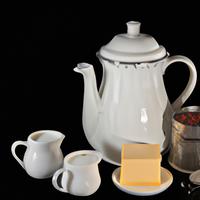
1 serving (240 grams) contains 20 calories, 1.0 grams of protein, 1.0 grams of fat, and 2.0 grams of carbohydrates.

Log this food in SnapCalorie

Nutrition Information
Calories |
20.0 | ||
|---|---|---|---|
% Daily Value* |
|||
| Total Fat | 1.0 g | 1% | |
| Saturated Fat | 0.5 g | 2% | |
| Polyunsaturated Fat | 0 g | ||
| Cholesterol | 5.0 mg | 1% | |
| Sodium | 20.0 mg | 0% | |
| Total Carbohydrates | 2.0 g | 0% | |
| Dietary Fiber | 0 g | 0% | |
| Sugars | 2.0 g | ||
| protein | 1.0 g | 2% | |
| Vitamin D | 10.0 mcg | 50% | |
| Calcium | 50.0 mg | 3% | |
| Iron | 0 mg | 0% | |
| Potassium | 80.0 mg | 1% | |
* Percent Daily Values are based on a 2,000 calorie diet. Your daily values may be higher or lower depending on your calorie needs.
Food Attributes
Source of Calories
About English breakfast tea with cows milk
English Breakfast Tea with cow’s milk is a beloved beverage originating from Britain, known for its robust flavor and comforting warmth. The tea itself is a black tea blend, often made from Assam, Ceylon, and Kenyan tea leaves, offering a rich and slightly malty taste. When paired with cow’s milk, its bold profile is softened, creating a creamy texture and balanced flavor. This drink is low in calories when unsweetened and contains antioxidants like flavonoids, which may help support heart health. It also provides a modest amount of calcium from the milk, contributing to bone health. However, added sugar can detract from its nutritional value, and some consumers may need to monitor caffeine intake. English Breakfast Tea with milk is widely enjoyed as part of traditional morning meals, reflecting its deep-rooted cultural significance and soothing appeal.



